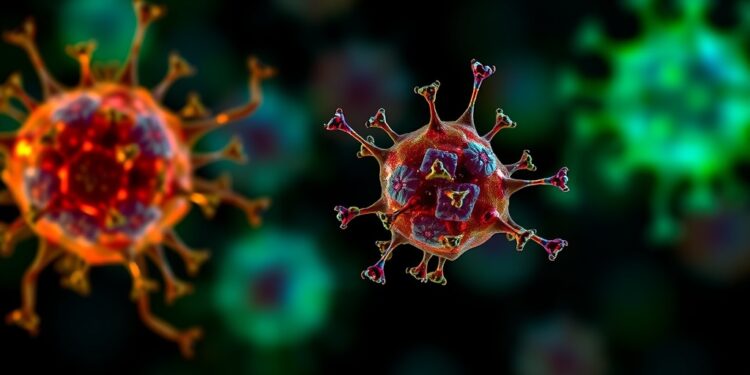Innovative Cell Therapy Offers Hope for Refractory CD30-Positive Lymphoma Patients
A groundbreaking study has unveiled a novel cell therapy strategy that employs cord blood-derived natural killer (NK) cells pre-complexed with AFM13, a bispecific antibody targeting both CD30 and CD16A. This innovative approach shows promising safety profiles and high response rates in patients suffering from refractory CD30-positive lymphomas, particularly high-risk groups that have not responded to traditional treatments. The work is notably spearheaded by researchers at The University of Texas MD Anderson Cancer Center and aims to transform the therapeutic landscape for patients battling these aggressive malignancies.
The Phase I trial results, recently published in the esteemed journal Nature Medicine, revealed an extraordinary overall response rate of 92.9% with a complete response rate hitting 66.7%. These figures were derived from a cohort of 42 heavily pretreated patients, meaning they had undergone numerous prior therapies and were still persistent in their illness. Such promising statistics signal not only a potential new direction for treating refractory lymphomas but also the flexibility of this strategy to be adapted for broader types of cancer as research progresses.
Principal investigator Dr. Yago Nieto, who serves as a professor in the Stem Cell Transplantation & Cellular Therapy department at MD Anderson, articulated the significance of these findings. He underscores the rapid and potent responses observed in patients treated with the AFM13-NK cells, affirming the ongoing evaluations of the therapy’s effectiveness in tackling challenging malignancies. His enthusiasm points to a larger ambition that this therapeutic innovation may serve either as a curative measure for some patients or act as a crucial bridge to potentially life-saving stem cell transplants.
The methodology behind this trial hinges on the unique characteristics of Affimed’s AFM13 bispecific antibody. This engineered molecule is specifically designed to bind with CD16A on NK cells and detects CD30 on malignant lymphoma cells. With this pre-complexing approach, AFM13-NK cells are empowered to better target and obliterate CD30-positive lymphoma cells. The process involves initially activating the NK cells using cytokines, expanding them in conjunction with artificial antigen-presenting cells, and then combining them with the AFM13 antibody before infusing them into the patient’s bloodstream.
The laboratory contributions of Dr. Katy Rezvani, who holds the Sally Cooper Murray Endowed Chair in Cancer Research, are fundamental to the development of this cell therapy. As the vice president of the Institute for Cell Therapy Discovery & Innovation at MD Anderson, Dr. Rezvani has been pivotal in advancing cell therapies, highlighting a concerted effort towards developing impactful innovations for multiple medical conditions.
The trial specifically included 37 adult patients with known CD30-positive Hodgkin lymphoma and an additional five with T-cell lymphoma. Notably, all participants had been heavily pretreated and had demonstrated non-responsiveness to established therapies, such as brentuximab vedotin and the anti-PD1 immune checkpoint inhibitors. The trial participants had a median age of 43 years, with an alarming median of seven prior lines of treatment, showcasing the dire circumstances faced by these patients when entering the study.
The trial involved administering a series of two to four cycles of chemotherapy, subsequently followed by infusions of the AFM13-NK cells at three different dose levels across three weekly sessions. Each treatment cycle concluded with a rigorous evaluation of each participant’s treatment response on day 28, along with structured follow-ups every three months to monitor their ongoing health status.
The results were not just numeric; they painted a picture of hope. The overall response rate (ORR) and complete response (CR) rates among study participants stood at an impressive 92.9% and 66.7%, respectively. Among those diagnosed with Hodgkin lymphoma, the statistics climbed even higher, with ORR and CR reaching 97.3% and 73%. Such results, particularly when benchmarked against this heavily pretreated patient pool, underscore the noteworthy effectiveness of the AFM13-NK cell therapy in these challenging cases.
Over a median follow-up period of 20 months, the two-year event-free survival (EFS) and overall survival (OS) rates for participants were reported as 26.2% and 76.2%, respectively. Given the refractory nature of the tumors exhibited by participants, these survival rates are particularly encouraging, reinforcing the therapy’s potential impact on long-term patient outcomes.
Despite the complexity of the treatment, patients tolerated the AFM13-NK cell therapy well, with no documented instances of cytokine release syndrome, neurotoxicity associated with immune cells, or graft-versus-host disease, which are common complications in such treatments. The only adverse event noted was a Grade 2 infusion-related reaction, suggesting the treatment’s safety profile is remarkably favorable compared to other emerging therapies.
Cord blood units selected for each treatment cycle were sourced from the MD Anderson Cancer Center Cord Blood Bank, adhering to strict criteria established for optimal donor cell characteristics. This attention to donor cell quality ensured that NK cells reached peak levels in patient blood one day following infusion, with a notable persistence of healthy donor cells up to three weeks, effectively enabling them to migrate towards tumor sites.
In conclusion, the trial demonstrated a promising safety profile and an encouraging level of efficacy for AFM13-NK cells specifically in patients dealing with refractory CD30-positive Hodgkin lymphoma. Dr. Yago Nieto’s statement reflects a growing optimism about the potential applications of this cell therapy methodology, suggesting it could not only revolutionize treatment protocols for Hodgkin lymphoma but also lay the groundwork for future research involving NK cells used in conjunction with bispecific engagers for various malignancies.
The research was supported by Affimed, with additional funding from MD Anderson and contributions from the National Institutes of Health. With the trial continuing to gather insights and data, medical professionals remain hopeful about translating these findings into widespread clinical practice, ultimately enriching the therapeutic options available for patients battling difficult-to-treat cancers.
Subject of Research: Novel cell therapy using NK cells for refractory CD30-positive lymphomas
Article Title: Innovative Cell Therapy Offers Hope for Refractory CD30-Positive Lymphoma Patients
News Publication Date: [Not Provided]
Web References: [Not Provided]
References: [Not Provided]
Image Credits: [Not Provided]
Keywords: Natural killer cells, cancer patients, Hodgkin lymphoma, CD30, cell therapy, bispecific antibodies.




